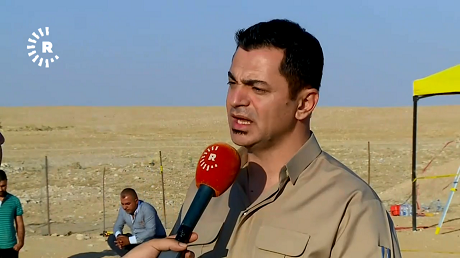ERBIL, Kurdistan Region — Teimour Abdulla is the lone survivor of a mass murder in the southern Iraqi city of Samawa in 1988. The atrocity was part of late President Saddam Hussein’s extermination campaign known as the Anfal, launched in the late 1980s to punish political dissidents, including many Kurds.
Ziya Karim, the head of the Department of the Affairs and Protection of Mass Graves in the Iraqi Martyrs Foundation, announced on Saturday they halted the exhuming process at three sites following Abdulla's call after "taking into account his physiological state."
"We did not want to turn to the judicial process because according to Law No. 13 (2015) which is about the protection of mass graves, anyone hampers the work of technical teams of the exhuming of mass graves, will be punished. But we did not want to do that as we took into account his physiological state," he confirmed to Rudaw on Saturday.
Abdulla was 12 years old when Iraqi soldiers rounded up most of his family and other villagers in the Garmiyan region, south of Sulaimani, and transported them more than 600 kilometers south to the deserts of Samawa.

Teimour Abdulla speaks to a reporter in Samawa, Iraq, on July 27, 2019. Photo: Rudaw video
Three mass graves were recently discovered there. A grave opened on Tuesday was found to contain the bones, hair, and clothing of 80-100 people, mainly women and children, according to a spokesperson for the Kurdistan Regional Government (KRG)’s Ministry for Martyrs and Anfal Affairs.
Abdulla does not support an exhumation of the site, however. He recently returned to Iraq from the US just to stop the exhuming of the mass grave, which contains the bodies of his relatives. For Abdulla, the bodies should not be dug up until those who participated in the killings are brought to justice.
"Our demands are clear, all the jash who are involved in Anfal and now they freely wandering in the Kurdistan Region, respected, and even have guards,” he said. “And if there is really law, those [jash] who number around 400 and are wanted by the Iraqi Supreme Court, must be tried."
Jash is a Kurdish word used to describe Kurds who conspired with Saddam's Baath regime against their own people.
"But unfortunately, they are sheltered," he said of the jash.
Many relatives of Anfal victims feel Kurdish authorities have not listened enough to them, according to Abdulla.
"It is not only me who is angry,” he said. “All the relatives of Anfal victims are angry because since the Kurdish government was established, demands from the Anfal survivors have been neglected.”
PHOTOS: Anfal victims exhumed from Iraq's southern mass graves
Abdulla added that he wants the Iraqi government to apologize to Kurds for the event and to pay Anfal survivors and their families. All of this is why he does not want the exhumation to continue at present.
Abdulla, along his relatives and other captives, were shepherded into several ready-dug pits and then sprayed with bullets at the time. He miraculously survived, suffering a non-fatal gunshot wound to his shoulder. Cared for by a Bedouin family in the desert, he lived to tell of the horrors.
The Anfal campaign took place over eight phases — beginning in 1986, reaching its peak in 1988 with the Halabja genocide that resulted in 5,000 people instantly killed in a chemical gas attack and another 10,000 injured. It culminated in the closing weeks of the Iran-Iraq war (1980-88).
The KRG has provided assistance for Anfal survivors and their relatives, including housing and tuition fees for studies.
Erbil has also made efforts to secure global recognition of the Anfal as an act of genocide, and to return the remains of victims from mass graves in Iraq’s southern and central deserts for reburial in the Kurdistan Region.
Hedar Zubir Barzani, an MP in the Iraqi parliament and former lawyer defending the rights of Anfal victims, has urged both Iraqi and Kurdish authorities to implement modern DNA testing techniques to help identify the dead and give their families closure.




.jpg?mode=crop&quality=70&rand=1&scale=both&w=752&h=472)
.jpg?mode=crop&quality=70&rand=1&scale=both&w=752&h=472)
.jpg?mode=crop&quality=70&rand=1&scale=both&w=752&h=472)
.jpg?mode=crop&quality=70&rand=1&scale=both&w=752&h=472)
.jpg?mode=crop&quality=70&rand=1&scale=both&w=752&h=472)
.jpg?mode=crop&quality=70&rand=1&scale=both&w=752&h=472)
.jpg?mode=crop&quality=70&rand=1&scale=both&w=752&h=472)
.jpg?mode=crop&quality=70&rand=1&scale=both&w=752&h=472)
.jpg?mode=crop&quality=70&rand=1&scale=both&w=752&h=472)
.jpg?mode=crop&quality=70&rand=1&scale=both&w=752&h=472)
.jpg?mode=crop&quality=70&rand=1&scale=both&w=752&h=472)
.jpg?mode=crop&quality=70&rand=1&scale=both&w=752&h=472)
.jpg?mode=crop&quality=70&rand=1&scale=both&w=752&h=472)
.jpg?mode=crop&quality=70&rand=1&scale=both&w=752&h=472)
.jpg?mode=crop&quality=70&rand=1&scale=both&w=752&h=472)
.jpg?mode=crop&quality=70&rand=1&scale=both&w=752&h=472)
.jpg?mode=crop&quality=70&rand=1&scale=both&w=752&h=472)
.jpg?mode=crop&quality=70&rand=1&scale=both&w=752&h=472)
.jpg?mode=crop&quality=70&rand=1&scale=both&w=752&h=472)
.jpg?mode=crop&quality=70&rand=1&scale=both&w=752&h=472)
.jpg?mode=crop&quality=70&rand=1&scale=both&w=752&h=472)
.jpg?mode=crop&quality=70&rand=1&scale=both&w=752&h=472)
.jpg?mode=crop&quality=70&rand=1&scale=both&w=752&h=472)
.jpg?mode=crop&quality=70&rand=1&scale=both&w=752&h=472)
.jpg?mode=crop&quality=70&rand=1&scale=both&w=752&h=472)
.jpg?mode=crop&quality=70&rand=1&scale=both&w=752&h=472)
.jpg?mode=crop&quality=70&rand=1&scale=both&w=752&h=472)
.jpg?mode=crop&quality=70&rand=1&scale=both&w=752&h=472)
.jpg?mode=crop&quality=70&rand=1&scale=both&w=752&h=472)
.jpg?mode=crop&quality=70&rand=1&scale=both&w=752&h=472)
.jpg?mode=crop&quality=70&rand=1&scale=both&w=752&h=472)
.jpg?mode=crop&quality=70&rand=1&scale=both&w=752&h=472)
.jpg?mode=crop&quality=70&rand=1&scale=both&w=752&h=472)
.jpg?mode=crop&quality=70&rand=1&scale=both&w=752&h=472)
.jpg?mode=crop&quality=70&rand=1&scale=both&w=752&h=472)
.jpg?mode=crop&quality=70&rand=1&scale=both&w=752&h=472)
.jpg?mode=crop&quality=70&rand=1&scale=both&w=752&h=472)
.jpg?mode=crop&quality=70&rand=1&scale=both&w=752&h=472)
.jpg?mode=crop&quality=70&rand=1&scale=both&w=752&h=472)
.jpg?mode=crop&quality=70&rand=1&scale=both&w=752&h=472)
.jpg?mode=crop&quality=70&rand=1&scale=both&w=752&h=472)
.jpg?mode=crop&quality=70&rand=1&scale=both&w=752&h=472)
.jpg?mode=crop&quality=70&rand=1&scale=both&w=752&h=472)





Comments
Rudaw moderates all comments submitted on our website. We welcome comments which are relevant to the article and encourage further discussion about the issues that matter to you. We also welcome constructive criticism about Rudaw.
To be approved for publication, however, your comments must meet our community guidelines.
We will not tolerate the following: profanity, threats, personal attacks, vulgarity, abuse (such as sexism, racism, homophobia or xenophobia), or commercial or personal promotion.
Comments that do not meet our guidelines will be rejected. Comments are not edited – they are either approved or rejected.
Post a comment